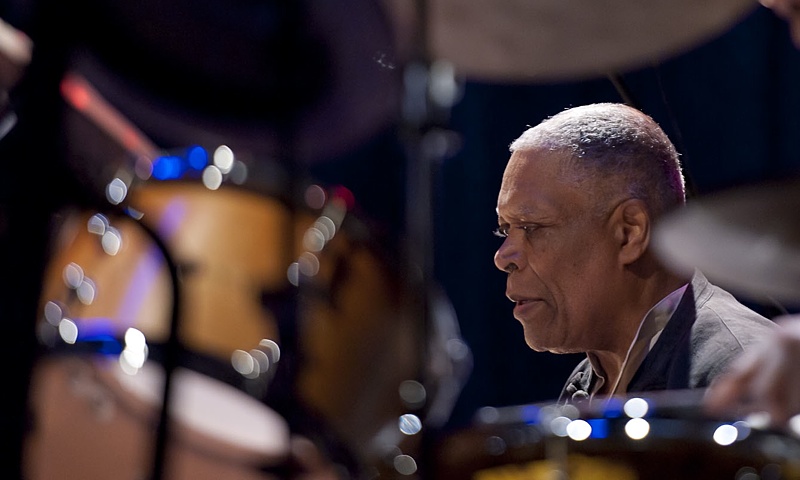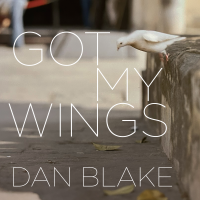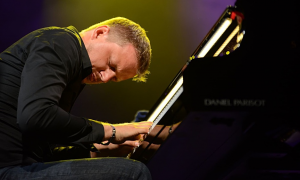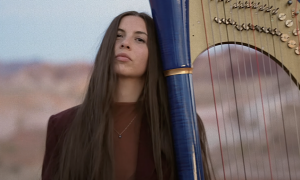Home » Jazz Articles » Interview » Billy Hart: Welcoming New, Loving Old, Sounds
Billy Hart: Welcoming New, Loving Old, Sounds

We're still trying to get in touch with that same emotion that everybody refers to as swinging or grooving or funky or whatever. It's just that now we have so much more of a vocabulary to choose from.
—Billy Hart
And at each concert, when Hart is being introduced by whomever the leader—Christian McBride, Eliane Elias, Joe Lovano, the Cookers—they always do so beaming with pleasure. It never fails. It's always done with a sense of genuine warmth. They know Hart has their back. He brings a quality to the music that's appreciated, whatever the situation.
"One of things would be my enthusiasm for their music," says Hart. "We're talking about some of the most creative minds that we have in this music today. It's not hard to be enthusiastic about it. And it's a worthy challenge. It gives you something positive to look forward to. Working toward a goal. My gratitude for that is my enthusiasm for their music."
"I work at it," he adds. "It isn't just that I do it. I enjoy it so much, that I work at it. I study the music. I study the people. I enjoy the work and enjoy the people. I think they see that enjoyment in me."
That has resulted in a long and busy career for the Washington, D.C. native, that includes associations with musicians like Jimmy Smith, and Wes Montgomery, McCoy Tyner, Wayne Shorter, Eddie Harris, Pharoah Sanders, Marian McPartland, Herbie Hancock, Stan Getz, Shirley Horn, Miles Davis and many more. Sideman gigs still keep him busy, as does teaching, but he also leads a noteworthy band that recently released a new album, One Is the Other (ECM). The band is comprised of saxophonist Mark Turner, pianist Ethan Iverson and bassist Ben Street. It's a lush, free-flowing collection of songs from a group formed to comply with Hart's quest for pushing music forward, using a variety of influences from music he has listened to from all over the globe.
"We have been together for a while. I think it's a situation where I offer a certain amount of experience to them in exchange for the youthful, new innovations that they bring to the table," says the drummer. "That's a healthy combination from my viewpoint. It gives me more energy and gives the whole situation more depth. As far as being free form, it's not as free as it would seem. The intent is still the same as it was with Louis Armstrong. The intent is to get in touch with that emotion. People give different names to it, because there are a lot of people who don't think of this music as classical music. So they've never given it any kind of name or nomenclature. We're still trying to get in touch with that same emotion that everybody refers to as swinging or grooving or funky or whatever. It's just that now we have so much more of a vocabulary to choose from.
Jazz music, to Hart, is inclusive of new ideas, expansive rhythms, other forms and other genres. The world is a smaller place now and that's applicable to the music and sounds embedded in it.
"In other words, as great as all the older masters are, in terms of commercial contact with the audience ... I don't think of Count Basie as being thoroughly connected, authentically, with Cuban rhythms. Today you have to be. I don't think of Fletcher Henderson or Earl 'Fatha' Hines as incorporating a lot of Indian rhythms. But today, you have to. We're talking about a vocabulary that defines a whole culture, so it's a whole new study of these different cultures. The world is getting smaller, and we're becoming more and more—at least through the music—one people. When you add the improvisation factor, as opposed to cutting things down for commercial purpose, then you have a lot to choose from. What it becomes is: How good are you at making choices in a compositional way?"
The eight songs on the new disk are all originals except one ("Some Enchanted Evening"), penned by Hart, Iverson and Turner (not on tandem). They have a certain open feel, with each member of the group adding their voice. It's never rushed; rather the songs unfold and their stories are told at an easy pace.
"They say Wayne Shorter listens to the music of a lot of film scores. I suspect in some ways, John Coltrane did the same things. I think there was a way, not only harmonically, but melodically, to look at different cultures and different ideas and see how that relates to the human emotion ... The vocabulary is much broader today. You learn all this stuff in school now. I think if you grew up in Russia in 1875, you know, you had the academic encouragement to really investigate music on a high level, based on the experience of maybe 500 years of study. Whereas in this country, we've barely had 100 years [of jazz]. Now, we've got all of these schools. Duke Ellington didn't go to a music conservatory. Most of today's innovators are coming out of universities. There's more of an academic concentration. So it's easier to explore all these different avenues. It's come to a lot of these guys are mastering these events or whatever, and they include them in their music. That's something that started happening right around my time. There were people that studied European classical music. That was considered the highest level of music education in the United States in those days. Miles Davis went to Julliard. That was a big thing. But now you can go to Julliard, but you can study not only Louis Armstrong, but Ravi Shankar. Not only Fletcher Henderson, but Eddie Palmieri."
His younger bandmates have not only academic studies, but valuable experiences with other bands. "Ben Street has been playing with Danilo Pérez for longer than he's been in my band. So his knowledge of, not only Afro-Caribbean rhythms, but African rhythms, is extensive. In a very authentic way," Hart explains. "As great as Lennie Tristano was, he didn't have a whole lot of Afro-American that were into Lee Konitz and Warne Marsh the way Mark [Turner] is. With that cross-cultural strength, they have so many ways to respond to me."
Hart's grandmother was a piano accompanist for the great opera singer Marian Anderson, "so growing up, just by circumstance, I began, by osmosis, to pick up a lot of the European classical repertoire, through my grandmother being a concert pianist. I didn't go to the conservatory to hear that, I grew up listening to it like another kid of the same age would grow up listening to the Beatles or something. Whatever the media puts in the forefront. So somebody like Ethan [Iverson], who had that gig with the Mark Morris Dance Group, where he had to be familiar with a lot of contemporary European classical concepts, he can sense my familiarity. Plus it works a lot with his expertise."
"And, of course, we wouldn't be invested in this music at all if it wasn't for the blues. Our desire to be related to the blues; anybody that loves so-called jazz. So we have all that in the mix. You're constantly going back and finding great blues masters for that strength and the emotion that gives you. And how you hear it in everybody else. Milt Jackson. Eddie "Lockjaw" Davis. Horace Silver. Hampton Hawes. Thelonious Monk. The guys that would emulate blues phrases in their playing. Then you have somebody like Wynton Kelly who would infuse those blues phrases with a sort of Afro-Caribbean sensibility, not unlike Sonny Rollins."
He adds, "From what we're playing, or what I'm being encouraged to reach for, is something that Coltrane called 'multi-directional.' Once Rashied [Ali, drummer] joined the band. Coming from those innovators like Milford Graves and Andrew Cyrille, Rashied Ali, Sonny Von Murray. Once it gets to my age group, there were guys like Barry Altschul, Stu Martin, Han Bennink, Jon Christensen out of Norway. Chicago ACM guys. Don Moye. This vocabulary is ongoing. What seems to be inventive today is going to be commonplace tomorrow."
Hart is pleased with the recording, but already looking ahead to what the band can do next and what challenges and surprises might be lurking. "I'm looking forward to making another [record] and making our purpose clearer to people who want to listen to us. With all these choices, it gives us new ways to push the envelope."
Hart recalls a conversation with Coltrane years ago, when the topic of the latest release by the saxophonist came up. "And he was saying, 'I've done that already. I'm not listening to that anymore.' I said, 'John, maybe you should.' He said, 'Aww, man. Come on.' Ellington too. Someone asked him in an interview what was the best thing he'd ever done. And he said without any hesitation, 'The next thing.' It's the excitement of being able to go on from what you've already done. It giving you more energy to go out and find these limitless ways of creating. It's an amazing inspiration," Hart says with enthusiasm. "It can be so exciting, these inspirations, that it's almost euphoric. Hopefully that translates to the audience."
Hart's own inspirations come from the blues and jazz that he listened to, as well as soul musicians like Otis Redding and Sam and Dave that he played with as a young man in D.C. He's basically self taught on the drums. As he developed and began getting more serious about the music, Albert 'Tootie' Heath, who with his brothers Jimmy and Percy, were making themselves known in Philadelphia. It was Albert Heath that turned Hart on to Ornette Coleman. "Ornette Coleman was quite the conversation piece. His drummers were Ed Blackwell and Billy Higgins, which now are household names. Their music and their drumming is a major influence on the way music is today. Even popular music."
Another Washington D.C. native Jimmy Cobb, was also a huge influence on Hart. "When I played with Wes Montgomery," the drummer notes, "it became obvious Jimmy was his favorite drummer, so he was happiest when I pursued that direction."
Others on Hart's list include Max Roach, Kenny Clarke, Philly Joe Jones and Roy Haynes. "Obviously, those were the gurus, the grand masters of my generation. But as you want to acquire more wisdom or depth, you have know where else to go, but go back. J.C. Heard, Papa Jo Jones, Chick Webb, Big Sid Catlett. With a certain amount of experience, you can piece that together. You can see how they influenced the future. Like pieces of a puzzle... There's a certain strength, after a while, you feel that you need to make these connections. And then from that, maybe you become part of the future. You begin to enjoy other people who seem to be part of the future, instead of saying, 'Man. What in the world is he doing? That's kind of weird.'"
Hart is a font of knowledge about the lineage of his instrument.
"Tony Williams, without a doubt, as far as I'm concerned is a pretty clear portrait of my generation. Jack DeJohnette is a musical phenomenon. In terms of concept, he can see it from the bass and the piano, as well as the drums. He's an extraordinary pianist and a great bassist too. A lot of people never knew that Philly Joe Jones was a great pianist and a great bassist and a great saxophonist. Once you do go back and find those things, that's when you begin to realize America has it's own classical music. Every culture on the planet has their own classical music. It's just that our particular capitalist system seems to only want to acknowledge the European process. But we're all human beings, so that process is everywhere ... we're beginning to be invested in the process of other cultures in a more sincere way."
In the late 1960s, Hart joined Herbie Hancock's band, a big move in his musical life. "Not unlike Duke Ellington, Herbie was able to find a logic in this capitalist system. Herbie seemed to have found a way to do that [meet commercial success] and still be able to function on an extraordinarily high creative level. I was lucky enough to be in his company for over three years. He's a huge influence on my musical direction. Herbie and McCoy [Tyner] are huge influences on me. But Herbie found a way to find a logic, to work with the system, which might seem a little difficult for the rest of us. [chuckles] Then there are other guys that have done the same thing, but haven't received as much notoriety."
Hart cites Frank Wess as a more low-key example of broad success in music. "An extraordinary high musical presence, but you didn't see his face on the cover of a lot of magazines. He's a great example of a great instrumentalist, a great composer, a great arranger and a great conductor. He made a better than decent living doing it... That's the example I try to suggest to my students, rather than go out and try to be famous like a gladiator in an arena. How about just being compensated for sincere hard work and study? To have somewhat of a normal life so you can raise a family. Instead of thinking of these guys as party guys, staying up all night and all the things that go along with that."
In 1972, Hart participated in the recording of Miles Davis's One the Corner (Columbia). But he had met Davis before that, and his encounters with the jazz legend, even of somewhat limited, had a profound effect on the drummer.
"It doesn't take much time with somebody likes Miles, as far as I'm concerned," to learn lessons," says Hart. "When Coltrane was interviewed about Miles, he said something very interesting. He said, 'Miles is the teacher.' Coltrane said that. I found that to be true in my case. The first time I came in contact with Miles Davis was when I was playing opposite him at the Village Vanguard with Shirley Horn, who actually might be the highest on my list as a mentor. I'm playing opposite Miles with Shirley. He didn't know me. I didn't live in New York. He immediately gave me some musical advice but in a philosophical way. Not like he was exchanging any secret. It was like he was sharing something, almost as if I already knew it. Some of that stuff took me 10 years to understand, and it was a 30-second thing that he said. That happened on more than one occasion. The next time I ran into him, I had moved to New York and I was playing at the Village Gate. I was playing with a blues band. He came by. There was nobody in the dressing room but me. And he imparted some other information.
"Every time he said something, it changed the way I played—immediately. Then he heard me with Herbie. He talked to me for about 15 minutes. It was like a master class. He always had the same approach, like he was saying something that I already knew. That was so gratifying. As amazing as he was—he was a big star, like a movie star—so to be able to come down for those few minutes to my level, like we were just high school buddies examining something we were both interested in. It was amazing he had the ability to do that. And if he did that with me, I'll say he did that with everybody else that he was interested in."
At recording sessions with Davis, "He would say these things as if we were comrades or buddies. But they were invaluable. Every time he said something, it changed my playing forever," avows Hart. "So there was Miles. Then Coltrane. If there's anybody who really touched my heart it was Coltrane. They asked him to explain what he was trying to do with his music. The inference for those times was whether he was trying to me a Malcolm X or Martin Luther King or something like that. He said, 'I simply want to be a force for good.' I think for people analyzing music, I don't think they were prepared for that answer; to see it on that level. And I believe that. There are going to be certain people who take the responsibility to uplift the community, not by doing things that they're already familiar with, but trying to broaden their experience in a positive way. Hopefully a more positive way."
Another band that Hart has been touring with is the Cookers, a superb group of hard swinging players who have a soulful drive, powerful pulse, and are strong improvisers. Joining Hart in the rhythm section is bassist Cecil McBee and pianist George Cables. Trumpeters David Weiss and Eddie Henderson are blowing strong on the front line, as is saxophonist Craig Handy. Hart likens it to a kind of social club, he has known some of the members for so long. With inside jokes and conversation based on years of friendship, he likened it to the groups of friends his parents always had at his house as a youngster, playing cards, exchanging stories, laughing.
"It's really funny. It makes me wonder what we would have been like if we were members of a corporation," says Hart, chuckling.
"When I take the time to slow down and reflect, I may be over doing it," says Hart, now 73. "There's a balance to life... If I can look at me from the viewpoint of other people, I should seem somewhat successful and somewhat happy."
For my music, from my age experience, I'm still looking for the swing you get from Count Basie or Duke Ellington or Charlie Parker or John Coltrane. I don't know anything else to strive for. I don't think there's a higher level, for me. Especially in contact with an audience. I'm not going to have some type of machine, whether it be media or electronic music, that's going to demand me to do it a certain way. I'm able to make improvisational choices."
Those choices are always on the money. For those enjoying the sounds of surprise that jazz entails, Hart has your back.
Selected Discography
Billy Hart, One Is the Other (ECM, 2014)
Billy Hart, All Our Reasons (ECM, 2012)
The Cookers, Believe (Motema, 2012)
The Cookers, Cast the First Stone (Plus Lion Music, 2011)
Billy Hart, Quartet (High Note, 2006)
Joe Lovano, Quartets: Live at the Village Vanguard (Blue Note, 1994)
Sonny Fortune, It Ain't What It Was (Konnex, 1992)
Billy Hart, Rah (Gramavision, 1987)
Stan Getz, Pure Getz (Concord Jazz, 1982)
Billy Hart, Enhance (Horizon, 1977)
Pat Martino, Exit (Muse, 1976)
Eddie Henderson, Sunburst (Blue Note, 1975)
Buster Williams, Pinnacle (Muse, 1975)
Azar Lawrence, Bridge into the New Age (Prestige, 1974)
Miles Davis, On the Corner (Columbia, 1972)
Herbie Hancock, Mwandishi (Warner Brothers, 1971)
Pharoah Sanders, Karma (Impulse!, 1969)
Photo credit: Steven Sussman
Tags
PREVIOUS / NEXT
Billy Hart Concerts
Support All About Jazz
 All About Jazz has been a pillar of jazz since 1995, championing it as an art form and, more importantly, supporting the musicians who make it. Our enduring commitment has made "AAJ" one of the most culturally important websites of its kind, read by hundreds of thousands of fans, musicians and industry figures every month.
All About Jazz has been a pillar of jazz since 1995, championing it as an art form and, more importantly, supporting the musicians who make it. Our enduring commitment has made "AAJ" one of the most culturally important websites of its kind, read by hundreds of thousands of fans, musicians and industry figures every month.



























